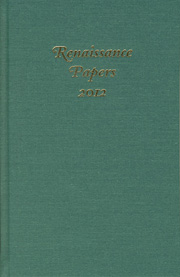Book contents
- Frontmatter
- Contents
- Dedication
- Reconstructing the Bower of Bliss: Homoerotic Myth-Making in The Faerie Queene
- Ovid, Lucretius, and the Grounded Goddess in Shakespeare's Venus and Adonis
- The Soul as Commodity: Materialism in Doctor Faustus
- Antipholus and the Exorcists: The Acts of the Apostles in Shakespeare's The Comedy of Errors
- Paul's Cross Churchyard and Shakespeare's Verona Youth
- The Summoning of Hamlet and Lear
- “Bred Now of Your Mud”: Land, Generation, and Maternity in Antony and Cleopatra
- Cosmetic Blackness: East Indies Trade, Gender, and The Devil's Law-Case
- From One Marvell to Another: Puritan Logic in “To His Coy Mistress”
- “An Heap Is Form'd into an Alphabet”: Thomas Blount's Sociable Lexicography
- Getting Past the Ellipsis: The Spirit and Urania in Paradise Lost
Ovid, Lucretius, and the Grounded Goddess in Shakespeare's Venus and Adonis
Published online by Cambridge University Press: 05 December 2013
- Frontmatter
- Contents
- Dedication
- Reconstructing the Bower of Bliss: Homoerotic Myth-Making in The Faerie Queene
- Ovid, Lucretius, and the Grounded Goddess in Shakespeare's Venus and Adonis
- The Soul as Commodity: Materialism in Doctor Faustus
- Antipholus and the Exorcists: The Acts of the Apostles in Shakespeare's The Comedy of Errors
- Paul's Cross Churchyard and Shakespeare's Verona Youth
- The Summoning of Hamlet and Lear
- “Bred Now of Your Mud”: Land, Generation, and Maternity in Antony and Cleopatra
- Cosmetic Blackness: East Indies Trade, Gender, and The Devil's Law-Case
- From One Marvell to Another: Puritan Logic in “To His Coy Mistress”
- “An Heap Is Form'd into an Alphabet”: Thomas Blount's Sociable Lexicography
- Getting Past the Ellipsis: The Spirit and Urania in Paradise Lost
Summary
In the sticky, sweet, and sweaty world in which Shakespeare situates his Venus and Adonis, something has gone awry. According to Venus, “Nature” is “at strife” with herself for having made Adonis. By “Nature” Venus is, of course, referring to herself. Compared to the Venus of book 10 of Ovid's Metamorphoses—a goddess who makes men and women fall in love, who brings stone to life, and whose magical doves transport her anywhere she wishes to go—Shakespeare's Venus is, by comparison, a much more natural being. A creature of the senses, most especially smell, Shakespeare's Venus does not so much manipulate the natural world as bond with it. She experiences heightened, animal-like sensibilities that allow her to commune with Adonis's horse and to imagine herself as the earthbound and hunted Wat the Hare.
But why would Shakespeare strip Ovid's goddess of her supernatural powers and drive her so literally down to earth? The answer, I would suggest, is that Venus and Adonis traces its ancestry not only to Ovid's Metamorphoses but also to Lucretius's De Rerum Natura. Consider the powerful invocation to Venus with which Lucretius begins his great philosophical poem on “the nature of things”: “Venus, power of life, it is you who beneath the sky's sliding stars inspirit the ship-bearing sea, inspirit the productive land.
- Type
- Chapter
- Information
- Renaissance Papers 2012 , pp. 13 - 20Publisher: Boydell & BrewerPrint publication year: 2013



